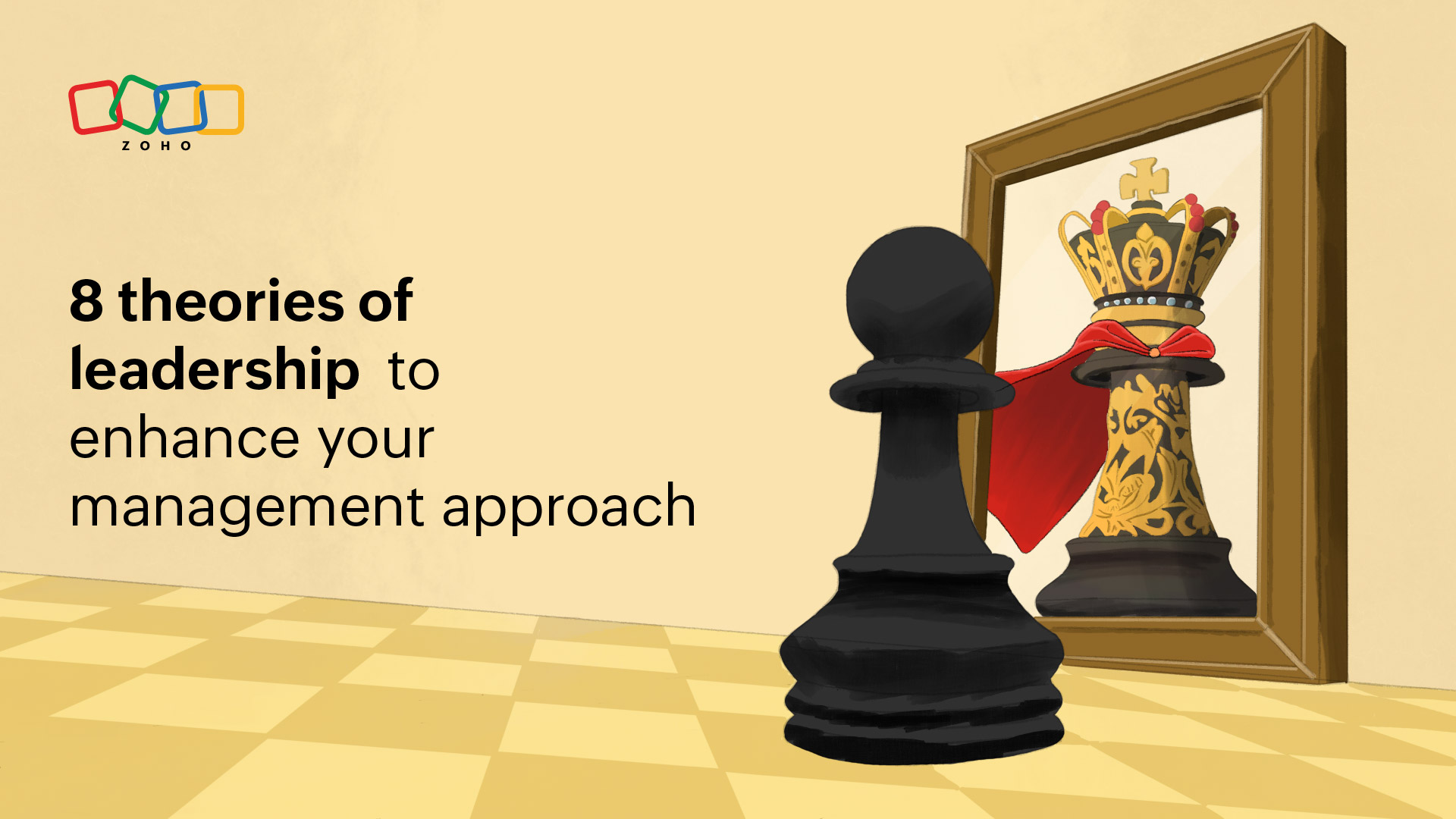- HOME
- All Topics
- Thought Leadership
- 8 theories of leadership to enhance your management approach
8 theories of leadership to enhance your management approach
- Published : May 9, 2025
- Last Updated : May 20, 2025
- 14 Views
- 6 Min Read
For centuries, the age-old question of why some leaders succeed while others falter has intrigued scholars, practitioners, and everyday managers alike. There isn’t a clear-cut answer, but a deeper understanding of leadership theories can give you valuable insights into how to be an effective leader.
At its core, leadership theory refers to a collection of ideas and schools of thought that explain how and why certain individuals emerge as leaders. These theories emphasize specific traits and behaviors that you can adopt and develop. But these aren’t rigid rules for you to follow. Think of them as frameworks you can use to understand and enhance your leadership abilities.

Why understanding leadership theories is important for business leaders
Whether you’re a seasoned business leader or an aspiring manager, having a grasp of leadership theories can be a practical tool that can guide decision-making and personal growth. They give you perspective on how effective your own leadership approaches are, allowing you to analyze your strengths and weaknesses, and, ultimately, improve things. You can also learn how to spot potential leaders and learn how to nurture them to enhance your organization.
Understanding different leadership theories also makes you more adaptive, which is critical in complex business environments. You’ll be able to pivot and adapt your leadership styles to different situations, better support diverse teams, and meet new challenges.
Whether it’s understanding the importance of emotional intelligence or recognizing the impact of situational factors, these theories act as signposts for developing your leadership practices to enhance your entire organization. Embracing these concepts can transform you as a leader from someone who merely manages tasks into one who inspires innovation, fosters inclusivity, and drives sustainable success.
Prominent and relevant leadership theories
Leadership has been studied and analyzed for a long time. The Epic of Gilgamesh, literally one of the oldest stories ever created by humans, is basically an analysis of what it means to be a capable king and leader. We won’t go over every single theory of leadership humans have developed for the last 4,000 years+ (hopefully you don’t work in an organization that bases leadership on something like the Divine Right of Kings), but here are some leadership theories that are relevant to modern business leaders.
The Great Man Theory
In essence, this is the idea that the qualities of leadership are something people are born with, and these qualities eventually lead them to rise to the top. This theory was developed in the 19th century, and it’s largely based on ideas around figures like Napoleon and Alexander the Great. The idea was that these individuals were born with the charisma, intelligence, diplomacy, and wisdom that predispose them to leadership roles.
In academic studies of history, this theory has been largely dismissed, as it ignores context and dismisses the support these individuals had from others. Furthermore, the idea that leadership qualities are something that people are born with has been largely dismissed as being overly simplistic (and a concept that’s been weaponized to gate-keep access to leadership roles).
It’s still worth being aware of as a baseline, and the idea that you can identify people with the potential to be good leaders early on is still viable. You just need to recognize they will still need nurturing and development, while being open to recognizing leadership potential in everyone else as well.
Trait Theory
Building on the idea of inherent characteristics, Trait Theory evolved as an extension of the Great Man perspective. Rather than simply stating that leaders are born, Trait Theory identifies specific qualities, such as emotional stability, responsibility, competence, empathy, communication, and ambition, that are commonly found in effective leaders.
What made this an evolution from the Great Man Theory was the idea that you can learn and develop these traits over time through experience and training. It’s the idea that "leaders are made, not born." It breaks down leadership into measurable and acquirable traits, making it the basis for many modern leadership development programs.
Behavioral Theory
While Trait Theory focuses on who you are as a leader, Behavioral Theory shifts the conversation to what you actually do. The idea is that effective leadership isn’t solely the product of inherent traits but is largely influenced by learned behaviors and skills. Going even further than Trait Theory, Behavioral Theory highlights the importance of technical, human, and conceptual skills that can be developed through practice and training.
At the core of this theory are two primary types of behaviors that are essential for effective leadership: being task-oriented and relationship-oriented. Being task-oriented means you can set clear goals, establish effective processes, and keep teams focused on achieving results, which is critical for organizational success. You also need to be relationship-oriented to foster trust, open communication, and strong interpersonal bonds to create a supportive environment for your team.
Behavioral Theory emphasizes the need for you to be adaptable because it encourages you to adopt the right behaviors for your current situation.
Contingency Theory
Taking the nuance even further, Contingency Theory is all about recognizing that effective leadership behavior is highly dependent on situational variables. It argues that there’s no one-size-fits-all approach to leadership. Instead, the best course of action for you as a leader depends on factors such as team dynamics, employee maturity, the pace of work, specific goals, and overall morale.
Taking this approach means you need to be able to assess the variables to determine the most effective approach for any given situation. Contingency Theory is closely linked to the idea that flexibility and context are key, and often involves the use of models and frameworks to guide you through the nuances.
Situational Leadership Theory
Closely related to Contingency Theory is Situational Leadership Theory, which also bases its ideas around adapting your leadership style to the needs of your team and current circumstances. What differentiates it from Contingency Theory is the greater emphasis on the maturity and needs of your team.
The idea is that as employees gain experience and confidence, your leadership approach should shift accordingly. You start by directing and coaching when they need a hands-on approach, and shift to supporting and delegating once you're both confident that they can handle things. This flexible approach to leadership allows you to be more responsive and effective in meeting the unique needs of your teams.
Transactional Leadership Theory
This theory operates on the premise that performance can be controlled through clear, structured transactions. You reward employees for meeting specific goals and discipline them for poor performance. Although considered somewhat outdated in today’s dynamic business environment, transactional leadership remains effective in situations where tasks are clearly defined and the primary objective is to maintain organizational stability.
It provides a straightforward framework for managing performance, but it often lacks the nuance required for fostering creativity and long-term employee engagement.
For example, many sales environments operate on a transactional leadership structure: You make a certain number of sales, and you receive a reward, like commission or a bonus. However, for more creative environments, the rigidity of transactional leadership might hamper creativity because the teams will be focused on attaining rewards and operating within the existing system rather than innovation or risk-taking.
Transformational Leadership Theory
In contrast to the transactional approach, Transformational Leadership Theory centers on the idea that the ability to perform isn’t fixed. Rather, it’s down to you as a leader to inspire your teams to achieve extraordinary results by nurturing relationships and fostering a shared vision.
Transformational leaders work to align the individual goals of their employees with the broader objectives of the organization. They focus on identifying areas for improvement and providing the support necessary for growth, leading to increased innovation, reduced turnover, and enhanced employee loyalty. Your goal is to create environments where creativity and innovation flourish.
Servant Leadership Theory
Rounding out the spectrum of leadership theories is Servant Leadership Theory, which kind of flips things. Rather than focusing on how to cement your power and authority as a leader, Servant Leadership prioritizes empowering team members to achieve their potential.
This approach is rooted in the idea that true leadership is about raising others up rather than asserting authority over them. Your job as a leader is to serve others and help them achieve greatness. This requires creating a supportive environment that fosters both personal and professional growth.
This requires a fine balancing act from you as a leader to ensure that your team’s personal goals are aligned with your organization's overall business goals.
Conclusion
There’s no single "best" approach to leadership. Instead, effective leadership is a blend of various theories, each offering unique insights and tools that can be adapted to fit specific circumstances.
Whether you’re a business leader or aspire to be one, the key takeaway should be that leadership is a continuous journey of growth, learning, and self-awareness. Ultimately, effective leadership is less about rigid adherence to a single theory and more about the thoughtful application of multiple perspectives. It’s about knowing when to rely on established principles and when to innovate, all while keeping the needs and aspirations of your team at the forefront.
 Gary Stevens
Gary StevensGary Stevens is the CTO of Hosting Canada, a website that provides expert reviews on hosting services and helps readers build online businesses and blogs. Gary specializes in topics on cloud technology, thought leadership, and collaboration at work.


